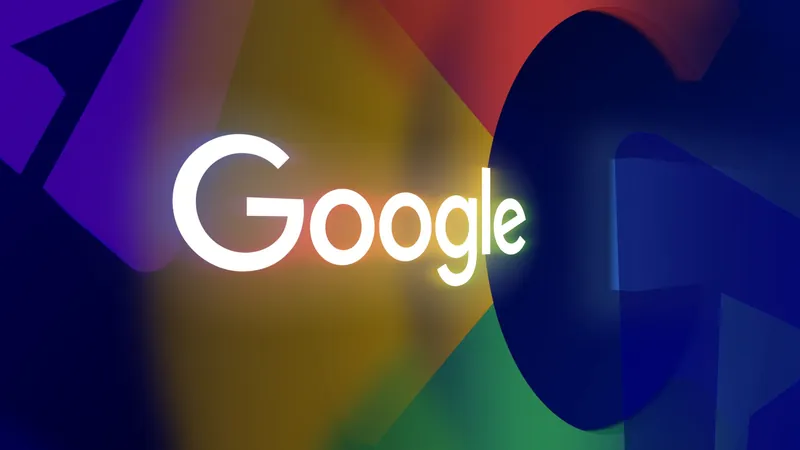
The Unbreakable Grip of Google's Ecosystem: How to Regain Your Digital Freedom
2025-04-06
Author: Li
In today's tech-driven world, many of us find ourselves deeply integrated into Google's ecosystem. For Android users, Google is inescapable, reigning supreme with services such as Gmail, Google Drive, YouTube, and Google Search. This reliance is not merely casual; over time, Google has entrenched itself into our daily routines, raising concerns about privacy and control over our data. As Google tightens its grip, it’s crucial to understand the implications for our digital identities and find ways to reclaim our autonomy.
The Strengthening of Google’s Ecosystem Lock-in
For countless individuals, a Google account is the gateway to their online existence. Whether it’s for email, cloud storage, or browsing the internet, Google connects our numerous digital strands into a tight web. While these products are certainly convenient, the task of switching to alternatives grows daunting. Migrating emails, files, and photos can feel like scaling a mountain, making it easy to hesitate in making a change.
One feature that deepens this lock-in is Google’s single sign-on (SSO), allowing users to access a multitude of services using their Google credentials. While it simplifies login processes, it also magnifies the challenge of steering clear of Google entirely. Losing access to accounts tied to your Google ID can deter many from even considering a switch.
The Play Store's Dominance
For Android users, the Google Play Store is a nearly obligatory source for applications. Although alternatives exist, they often fall short in terms of variety and security comparisons. Google's stringent policies discourage third-party app stores and developers, effectively ensuring that the Play Store remains the go-to option for most users. Developers are also compelled to use Google’s payment system, which can inflate costs and further reduce the appeal of emerging platforms.
Additionally, many apps rely on Google Play services to function, complicating any efforts to switch away from Google's realm. Despite attempts to sidestep the Play Store, you may find that apps are incomplete without Google’s services, further securing your dependence.
The Challenges of Exiting Google's Ecosystem
For many, the thought of leaving Google evokes anxiety due to the consolidation of data across various services. Data migration can be a painstaking process, particularly since Google offers a limited 15GB of free storage. Once that free space is exhausted, users are pushed toward paid plans, enhancing the hurdles when considering alternatives.
Google’s ad-based business model continually reinforces its grip on users. By collecting vast amounts of personal data, Google enhances its advertising capabilities and overall service quality, entrenching itself deeper into our lives.
Strategies for Reclaiming Digital Independence
To loosen Google’s hold on your digital life, start by seeking non-Google alternatives for essential services. Options like ProtonMail for email, Nextcloud for cloud storage, and Firefox as a browser are excellent places to start. Although adjusting to these alternatives may require some effort, they offer enhanced privacy and independence.
For services such as navigation and search, consider using OsmAnd, DuckDuckGo, or Qwant. Open-source applications like Signal for messaging and LibreOffice for document editing can also help break from Google's features.
To execute a shift, utilize Google Takeout to export your data, and explore independent cloud providers or self-hosted solutions that put you back in control.
Exploring Alternative App Distribution Channels
If you want to bypass the Google Play Store altogether, consider using platforms like F-Droid, the Amazon Appstore, or downloading APK files directly from developers. While the Samsung Galaxy Store could serve as a partial substitute, it remains tethered to Google’s services.
Embracing De-Googled Devices
For those serious about escaping Google’s ecosystem, consider using or installing operating systems that deliver a Google-free experience, such as /e/OS or GrapheneOS for Pixel devices. These alternatives require some technical knowledge but allow you to enjoy the flexibility of Android without the compromises that come with Google services.
Conclusion: The Path Forward
Finding a balance in a Google-centric universe is undoubtedly challenging, but it is not impossible. With the right tools and a commitment to exploring your options, you can reclaim substantial control over your digital identity and enjoy a more private online experience. Are you ready to step out of Google's shadow and take back your digital life?


 Brasil (PT)
Brasil (PT)
 Canada (EN)
Canada (EN)
 Chile (ES)
Chile (ES)
 Česko (CS)
Česko (CS)
 대한민국 (KO)
대한민국 (KO)
 España (ES)
España (ES)
 France (FR)
France (FR)
 Hong Kong (EN)
Hong Kong (EN)
 Italia (IT)
Italia (IT)
 日本 (JA)
日本 (JA)
 Magyarország (HU)
Magyarország (HU)
 Norge (NO)
Norge (NO)
 Polska (PL)
Polska (PL)
 Schweiz (DE)
Schweiz (DE)
 Singapore (EN)
Singapore (EN)
 Sverige (SV)
Sverige (SV)
 Suomi (FI)
Suomi (FI)
 Türkiye (TR)
Türkiye (TR)
 الإمارات العربية المتحدة (AR)
الإمارات العربية المتحدة (AR)